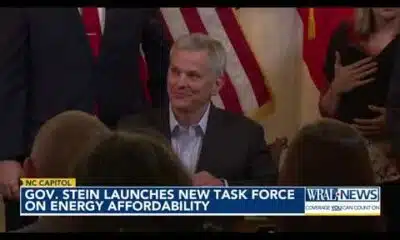News from the South - Missouri News Feed
Kansas City must be clear-eyed about spending taxpayer money to build stadiums for billionaires
by Patrick Tuohey, Missouri Independent
April 25, 2025
Should a city’s love of beloved sports franchises outweigh their financial considerations?
Long time Missouri sports reporter, Vahe Gregorian, wrote a moving and nostalgic piece in The Kansas City Star about the Royals, their cherished place in our collective identity, and their desire to build a baseball park downtown.
The emotional pull is undeniable. As a transplant to Kansas City, I marveled in 2015 at the pictures and stories on social media of friends and neighbors who attended the Royals 1985 World Series with their parents then doing the same with their own children. Even as I write this, it remains a powerful example of how professional sports can bring a community together.
Yet there are plenty of Kansas Citians who are just as emotionally moved to protect Kauffman Stadium itself, the place of both the team’s Series wins. The K is often rated highly among MLB parks, which doesn’t include the strong affinity Royals fans have for Ewing Kauffman himself. The park itself holds emotional and cultural value.
But the effort to use taxpayer money to build a downtown park is not a romance novel, it is a business proposal. It ought to be understood as such.
Royals owner John Sherman certainly understands it as a business deal. In a recent radio interview, Sherman said the team needs a newer building, a modern building, because the K was, “not competitive.” What does that mean? According to, “The Business of Sports,” edited by Scott Rosner and Kenneth Shropshire, “Much of the reason why existing stadiums are considered ‘obsolete’ is because they lack enough high-priced corporate seating,” such as luxury boxes and club seats which businesses may purchase and claim as tax deductions.
Nothing romantic there.
In turn, proponents of a downtown stadium offer smoke-and-mirrors arguments about all the economic benefits of a downtown stadium. At best, moving the park downtown changes spending—it does not create new spending. Where fans once may have visited liquor and grocery stores on their way to the K, they would now spend those same dollars at the new park and adjacent restaurants and bars.
That’s not new money for the city or county. Quite the opposite, because current spending goes to places whose sales, income and property taxes support vital public services. But the subsidy regime for a new park would mean taxes collected at or around the new park would be returned to the developer for decades.
Gregorian cites the resuscitation of downtown by the Power & Light District as an example of economic success. It is anything but. The city did not create new economic activity, it merely redirected it from elsewhere, and in doing so, forwent millions in tax revenue. If downtown is considered a success, why are we still discussing new subsidies there 20 years later? When do taxpayers get to claim success and move on?
As for the April 2024 campaign, Gregorian quotes Royals owner John Sherman lamenting that the team did not have enough time to put together a sound proposal for the East Crossroads location. Recall, however, that Jackson County Executive Frank White vetoed putting the vote on the April 2 ballot and was initially supported by county legislators. But an ad campaign by the Chiefs and Royals pressured legislators to override White, which they did. If Sherman regrets the short campaign, he has only himself to blame.
Perhaps most unsettling is Gregorian’s mention that Sherman has been a substantial philanthropist for city causes. His generosity is welcome and laudable. It is a credit to Sherman himself. Yet the message seems to be, as it has for other wealthy Kansas Citians seeking public subsidies, that taxpayers somehow owe them.
That is not charity; it is quid pro quo.
The Royals are culturally important to Kansas City. And we love our teams. But Kansas Citians must be clear-eyed about what is being asked of them: billions of dollars to move a park six miles so already-wealthy business owners can earn even more.
There is nothing romantic or nostalgic about that.
Missouri Independent is part of States Newsroom, a nonprofit news network supported by grants and a coalition of donors as a 501c(3) public charity. Missouri Independent maintains editorial independence. Contact Editor Jason Hancock for questions: info@missouriindependent.com.
The post Kansas City must be clear-eyed about spending taxpayer money to build stadiums for billionaires appeared first on missouriindependent.com
Note: The following A.I. based commentary is not part of the original article, reproduced above, but is offered in the hopes that it will promote greater media literacy and critical thinking, by making any potential bias more visible to the reader –Staff Editor.
Political Bias Rating: Center-Left
The article presents a critical stance on the proposal to build a new downtown ballpark for the Kansas City Royals, primarily focusing on the financial implications for taxpayers. It challenges the romanticized view of a new stadium and emphasizes concerns about public money being spent to benefit already-wealthy business owners. The tone is skeptical of the economic benefits touted by proponents of the stadium, suggesting that it would redirect, rather than generate, economic activity. The critique of corporate interests, particularly in relation to tax subsidies and the wealth of stadium owners, aligns with a Center-Left perspective that prioritizes the equitable use of public funds and scrutinizes corporate influence in local development.
News from the South - Missouri News Feed
Five new Missouri laws to know that become official Thursday
SUMMARY: Starting August 28, 2025, several Missouri laws will take effect, impacting economy, safety, and more. HB 567 ends mandated paid sick leave and halts minimum wage cost-of-living increases. SB 28 eliminates temporary vehicle tags, requiring sales tax payment and issuance of printed plates at purchase. SB 43 criminalizes hazing in universities, limits childhood marriage licenses, and encourages reporting hazing incidents with immunity. SB 82 restricts water exports outside Missouri, requiring permits and oversight to protect resources. SB 133 mandates contacting Missouri 811 before any digging to prevent utility damage. Additional laws address newborn safety, hearing aids, substitute teaching, school participation, cell phone policies, invasive plants, and court interpreters.
The post Five new Missouri laws to know that become official Thursday appeared first on fox2now.com
News from the South - Missouri News Feed
LIVE SOON: Authorities to speak after at least 5 students injured, suspect ‘contained’ in Minneapolis Catholic school shooting
SUMMARY: A shooting at Annunciation Catholic School in Minneapolis injured at least five children, with the suspected shooter contained. The incident occurred during an all-school Mass. Children’s Minnesota and Hennepin Healthcare treated victims, while police reported 20 total victims. Three people, including the shooter, are reported dead. Nearby residents heard several minutes of gunfire. Families gathered at a reunification zone as students were evacuated. Governor Tim Walz and Mayor Jacob Frey condemned the violence, with emergency teams activated. The FBI is involved, sending agents to the scene. The community is shaken, with many expressing fear and sorrow over the tragedy.
Read the full article
The post LIVE SOON: Authorities to speak after at least 5 students injured, suspect 'contained' in Minneapolis Catholic school shooting appeared first on www.ozarksfirst.com
News from the South - Missouri News Feed
Missouri becomes first state to repeal capital gains tax, at an estimated $625M cost
by Rudi Keller, Missouri Independent
August 27, 2025
A new Missouri income tax cut exempting profits from the sale of investments officially takes effect Thursday, along with smaller tax changes that will remove sales tax from diapers and feminine hygiene products.
All state laws passed in a regular session take effect Aug. 28 unless another date is specified. The capital gains tax cut will apply to all gains since Jan. 1 and will be reflected in the income tax returns due in April.
With the bill, MIssouri became the first state to exempt profits from the sale of assets such as stocks, real estate, and cryptocurrency from income tax.
“The (Department of Revenue) is already preparing for next year’s tax season and we are making the adjustments required to accommodate this and other new laws that affect taxpayers,” Trish Vincent, the state revenue agency’s director, said in a news release.
The exemption is officially estimated to reduce revenue by approximately $157 million in the current fiscal year and about $111 million annually on an ongoing basis. But the fiscal note, updated June 23 after the bill was passed but before Gov. Mike Kehoe signed it, included a warning that the impact could be much larger.
Missouri taxpayers claimed $13.3 billion in capital gains income for 2022 on their federal income tax forms.
“Therefore, taking the 4.7% top rate would yield ($625.6 million) for FY 2026,” the new fiscal note states.
That is the same estimate The Independent reported in April based on estimates from the Institute for Tax and Economic Policy. The oversight division stated it “does not currently have the resources and/or access to state tax data to produce a thorough independent revenue estimate and is unable to verify the revenue estimates provided by (the Department of Revenue).”
Federal tax changes will further reduce state revenue, and the state is anticipating new costs for programs such as Medicaid funded jointly with the federal government.
Through Monday, general revenue has grown faster than expectations but the trend for the year is not clear. When he signed the budget in June, Kehoe vetoed about $300 million in earmarked items and warned of a looming shortfall.
“The Office of Administration’s Division of Budget and Planning estimates a nearly $1 billion shortfall in general revenue starting in (fiscal year 2027),” the release stated. “Contributing to this shortfall, ongoing general revenue spending authorized in the (fiscal year 2026) budget is projected to outpace ongoing revenues by nearly over $1 billion and grow larger in future years.”
YOU MAKE OUR WORK POSSIBLE.
Missouri Independent is part of States Newsroom, a nonprofit news network supported by grants and a coalition of donors as a 501c(3) public charity. Missouri Independent maintains editorial independence. Contact Editor Jason Hancock for questions: info@missouriindependent.com.
The post Missouri becomes first state to repeal capital gains tax, at an estimated $625M cost appeared first on missouriindependent.com
Note: The following A.I. based commentary is not part of the original article, reproduced above, but is offered in the hopes that it will promote greater media literacy and critical thinking, by making any potential bias more visible to the reader –Staff Editor.
Political Bias Rating: Center-Right
This content focuses on a Missouri state tax policy that exempts capital gains from income tax, a measure generally favored by fiscally conservative or center-right policymakers who advocate for lower taxes to stimulate investment and economic growth. The reporting is largely factual and includes budgetary concerns and potential revenue shortfalls, providing a balanced overview without strong partisan language. Overall, the tone and content align with a center-right viewpoint, emphasizing tax cuts and fiscal implications common in conservative economic policy discussions.
-
News from the South - Arkansas News Feed6 days ago
New I-55 bridge between Arkansas, Tennessee named after region’s three ‘Kings’
-
News from the South - Texas News Feed4 days ago
DEA agents uncover 'torture chamber,' buried drugs and bones at Kentucky home
-
News from the South - Louisiana News Feed7 days ago
Families with citizen children deported by ICE sue Trump administration
-
News from the South - Missouri News Feed6 days ago
Missouri settles lawsuit over prison isolation policies for people with HIV
-
News from the South - Georgia News Feed7 days ago
Bookman: Here’s how Georgia’s 2020 election crisis will factor into 2026 GOP campaigns for governor
-
Local News5 days ago
Florida must stop expanding ‘Alligator Alcatraz’ immigration center, judge says
-
News from the South - Virginia News Feed6 days ago
Erin: Tropical storm force winds 600 miles wide eases into Atlantic | North Carolina
-
Our Mississippi Home6 days ago
Vardaman: The Sweet Potato Capital Serving Up Love, Tradition, and Flavor at Sweet Potato Sweets










































